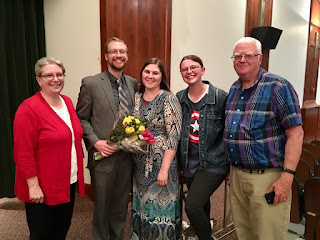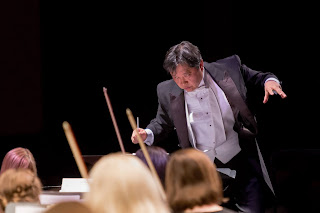By
Bryce Christensen
No
one will ever mistake Cedar City’s Heritage Center for an astronomical
observatory. It looks nothing like Palomar or Mauna Kea. And yet on the night of April 12th, there was
Harold Shirley--president of the Orchestra of Southern Utah (OSU)--telling the
music lovers gathered at the Center for an OSU concert that to understand their
evening’s musical experience, they needed to consider the astounding new
telescope technology recently highlighted in Cedar City’s Daily News. For,
Shirley explained, during the evening’s concert, they were about to “ascend to
the heavens with music.”
Truly
celestial, the evening’s performance--dedicated to the theme “Glorious
Galaxies”--lived up to everything Shirley promised in his welcoming remarks.
Indeed, in the evening’s first number, Part II of John Williams’
soundtrack for the Star Wars Epic, listeners traveled at light speed to
“a galaxy far, far away,” there to relive the cosmos-traversing adventures of
Luke Skywalker, Princess Leia, and Han Solo as they battle the ominous Darth
Vader and his legions of stormtroopers. Though it has been more than four
decades now since this science-fiction melodrama first burst onto the cinema
scene, OSU director Xun Sun and the musicians under his light-saber baton
instantly dissolved time and space as they once again transported the audience
to Tatooine, Hoth, and Yavin 4. Under Sun’s energetic direction,
the orchestra recaptured much of the brio of the soundtrack symphony that
originally infected millions with such an impelling sense of cosmic mystery, of
Imperial threat, and of Rebel triumph that they left theaters in 1977
unconsciously humming Williams’ composition for weeks and weeks thereafter.
Yes, the Force was with OSU on this night.
No
far-flung galaxies, no Millennium Falcon, no Death Star, no jumps to Hyperspace
in the evening’s second number: Verdi’s La Donna è Mobile from Rigoletto.
Indeed, listeners in the audience might well have supposed that the theme
of galactic exploration had given way to merely terrestrial concerns as they
caught the first notes of this beguiling canzone in which the Duke of Mantua
reflects on the fickleness of women (with comically obtuse refusal to
acknowledge his own licentiousness). But as they realized the vocal
strength of the soloist, Matthew Clegg, they quickly recognized that right
there in front of them on the stage was that most marvelous of astronomical wonders:
a star, and a rising star at that. A
graduate of Southern Utah University now studying voice at the University of
Nebraska--Lincoln, Clegg brought to his rendition of the Verdi composition and
the two numbers that followed all the brilliance of a new Alpha star-- a new
Sirius or Canopus.
The
astral luminosity of Clegg’s singing grew even more intense in “When I Consider
the Heavens,” a number especially commissioned for this concert. Composed
by Canyon View High School’s vocal director, Alex J. Byers, this number
explored the human challenge posed by cancer, plumbing its in extremis pathos
while also venturing to the summits of the faith this often-lethal disease
calls forth in its sufferers. Interpreting the text Byers had deftly woven
together from a handful of Psalms, Clegg seamlessly moved from passages of
shocked dismay, to measures of plaintive pleading, to ascents of transcendent
hope. As members of the audience listened to Clegg’s
masterful delivery of Byers’ artistically radiant composition, they recognized
that were actually experiencing an empyreal conjunction of two first-order
stars. As composed and sung, the deftly modulated words from Scripture
piercingly reminded listeners that the Heavens that ultimately matter most are
not those of Sci-Fi Fantasy.
Though
the star shining most astoundingly during Byers’ number was Clegg, cellist Nina
Hansen deserves favorable mention for her superb instrumental solo during this
selection. Lyrical, sonorous and pure, it was a solo to remember.
The
kind of hope that carries distressed humans toward the stars persisted in
the final number before intermission:
Graham and Loveland’s “You Lift Me Up.” Made famous by a stirring
rendition by Josh Groban, this number afforded Clegg a final opportunity to
shine--and shine he did, accompanied with irresistible energy by the orchestra.
Before Clegg left the stage, listeners--rising in a spontaneous standing
ovation--honored him as a star from very high in the firmament. Appropriately, OSU Director Xun Sun summoned
Alex Byers to the stage for his share in the warm applause.
After
the intermission, Xun Sun and the orchestra again launched into outer space as
they performed three movements--Mars, Venus, and Jupiter--from Holst’s The
Planets. Suggestive not of the TIE fighters and Star Cruisers
evoked by Williams’ Star Wars score, Holst’s music summoned the mythical gods
and goddesses for whom the planets visited were named. As they delivered
first the brooding intensity of Mars, an intensity that erupted into violent
dissonance, and then the irenic harmony and serenity of Venus, and finally
the genial and frolicsome warmth of Jupiter, Sun and the orchestra once
again demonstrated their astonishing musical versatility and their consummate
virtuosity. The collective achievement was impressive.
But
while the members of the orchestra were demonstrating their exceptional musical
skills, concert-goers witnessed an unexpected and richly entertaining
complementary manifestation of gymnastic skill: four gifted female acrobats
from Aerobatics Performing Arts executed dazzling maneuvers choreographed to
mirror the mood of the music. During Mars, the audience marveled at the
sheer energy of all four acrobats performing on four aerial rings, two on each
side of the stage. During Venus, the acrobats completed more elegant solo
maneuvers as the spotlight moved from one side of the stage to the other and
then back again. And during Jupiter, pairs of acrobats--one on each side
of the stag--amazed by climbing, tumbling from, and riding aerial silks.
Imaginative and innovative, the fusion of orchestral and acrobatic
artistry gave concert-goers fresh reason to applaud a community orchestra that
constantly explores new ways to delight its patrons.
No
one leaving the Heritage Center after the concert could question the decision
of Cedar City’s Chamber of Commerce to honor the Orchestra of Southern Utah as
the city’s Organization of the Year nor the verdict of St. George’s Indy in
naming the orchestra as the region’s Music Organization of the Year.
Concert-goers could also fully understand why the Dixie and Anne Leavitt
Foundation chose to underwrite this concert--and who would not feel deeply
grateful that the generosity of this foundation made this galactic musical
adventure affordable?
The
only sadness concert-goers felt as they left the
concert-hall-cum-galactic-observatory was that, as the last concert of this
season, this concert marked the end of musical adventures until fall.
Fortunately, the experiences of this season--on earth and in the
stars--have kindled very high hopes for the 2018-2019 season!
































